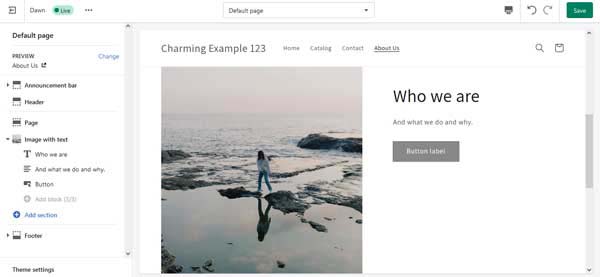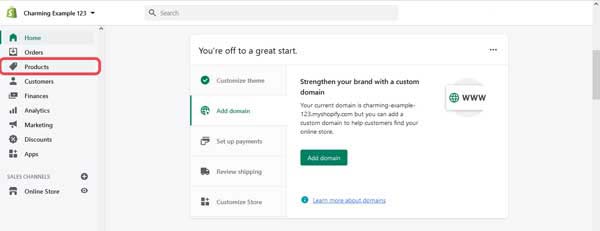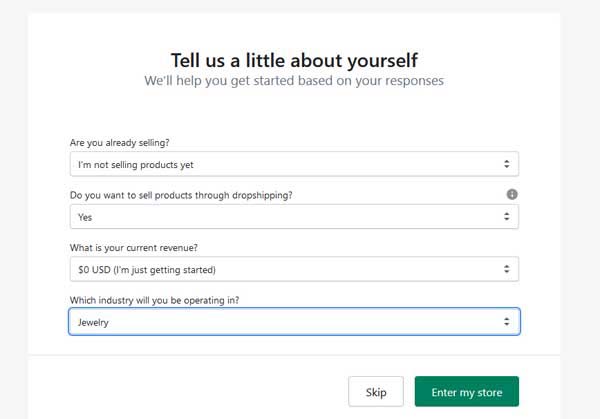Best Website Builder for Online Restaurant Supply Retailers in 2025
Building a website is a necessary step in selling your goods online. Your ecommerce site is the virtual home of your business, where you can showcase products and interact with customers.
Since you’re building a website to sell restaurant supplies, your needs will differ slightly from other ecommerce sites. This guide will help you find the best website builder for online restaurant supply retailers currently available and give additional recommendations to help you create the best website for your business.
Make sure you have everything you need to get started. Check out our Best Website Builder Review and How to Make a Website guides to get started on the right foot!

Best Website Builder for Online Restaurant Supply Retailers: Our Recommendation
Our #1 recommended website builder for online restaurant supply retailers is Shopify. Its featured collections tool makes it easy to highlight your top sellers or new items, and the Shopify Website Builder makes it easy to add products, edit pages, and add anything your online store might need to thrive.
Shopify
Best overall restaurant supply website builder:
- Best Theme Designs
- Featured Collections
- Sell on Social Platforms
- Free Trial Available
Using the Shopify Website Builder for Restaurant Supply Websites
It’s important to understand what your goals are when you begin creating a website for your business. When building a restaurant supply website, your primary objectives will be to:
- Showcase your product inventory.
- Sell your restaurant supplies online.
The Shopify website builder comes equipped with many different tools that can help you build the perfect website for your restaurant supply business. You may wonder why you need so many tools to create a simple website, but the different features of this builder all work together to make website-building easy.
If you have no technological experience, you can still use the Shopify website builder. There’s absolutely no coding or technical knowledge required.
One of the tools that can help you build a great website for your restaurant supply business is Shopify’s “Images” dashboard. It’ll enable you to easily add images to your site that showcase your product inventory. This means site visitors can see what you have to offer without ever entering your physical location.
Below, you can see how to add an image and its description to your website.

Another major benefit of using the Shopify website builder is access to its ecommerce features. Shopify is the highest-ranking ecommerce platform on the market, and its ecommerce features are much easier to use than those in other website builders.
As a restaurant supply retailer, you may want to list some — or all — of your inventory on your website for sale. You can do this using Shopify’s ecommerce features. For example, adding products to your website is simple with Shopify’s “Products” feature. In the screenshot below, you can see how to add a product along with a description to your website.

Restaurant supply retailers have some specific needs for their websites. Using the Shopify website builder’s “Images” and “Products” features, you can create a professional website that displays and sells your restaurant supplies online. That’s why we rate Shopify the top website builder for ecommerce.
Getting Started With Shopify
One of the other major benefits of the Shopify Website Builder is the ease of getting started. All you have to do to begin your free trial is enter in your email, a password, and the name of your shop. Shopify will then ask you a quick series of questions to better customize your shop theme. Fill out the sections accordingly and select “Other Food & Drink” for the industry you operate in.

Once you click “Enter my store,” you’ll be taken to your Shopify dashboard, where you can begin creating your online shop.
Shopify’s builder uses your answers to better understand your business name and type so as to construct a theme that’ll best suit your business.
Once here, you can begin to customize the theme to match your branding or choose a new one entirely. There are ways to begin adding products, connecting to social media to sell on other platforms, and even ways to collect customer emails for future alerts and sales campaigns.
Depending on the level of customization that you would like to do, you can continue to add, change, and move things around until you have your dream website!
Cons of the Shopify Website Builder for Restaurant Supply Websites
While this website builder is our recommended pick for online restaurant supply retailers, it’s not totally flawless. There are a few things that may push certain users to other builders. These cons include:
- Lack of Payment Flexibility — As a restaurant supply business owner, you’ll need a way to accept payments if you plan to sell your inventory online. The Shopify website builder definitely has that, but there’s a catch. If you want to offer payment flexibility to your customers, you’ll run into some issues. If your customers want to use anything other than the Shopify Payments system (e.g., PayPal or Venmo), you’ll incur a 2% transaction fee on those purchases. Moreover, you can only process subscription orders using Shopify Payments.
- Limited Versatility — The Shopify website builder is the top builder for ecommerce sites. If your business doesn’t plan to use its ecommerce features, however, Shopify’s cost may not seem worthwhile. In that case, consider GoDaddy for a more affordable option with more modest ecommerce features.
Shopify Website Builder Summary
Overall, the Shopify Website Builder is our top recommendation for online restaurant supply retailers selling online. The pros outweigh the cons by a landslide.
Check out the Shopify Website Builder for yourself and start your free trial!
For more information on the Shopify Website Builder, check out these articles:
- Shopify Website Builder Review
- How to Make a Shopify Website
- How to Use the Shopify Website Builder
- Shopify Website Builder Pricing and Plans
- Shopify Website Examples
Web.com
Like most website builders nowadays, Web.com enables users to quickly create a functional website without needing to write a single line of code. It also includes an extremely affordable signup offer for the first month, which allows for time to learn the platform before having to truly pay for it. As one of the first website builders available on the internet, it has also perfected the art of drag-and-drop functionality and includes fast uptimes, allowing your site to be better optimized for search engines.
The problem is that Web.com hasn’t entirely updated with the times. Its templates feel a bit outdated, and there are moments when using the editing tool feels a little less intuitive than it does on more modern platforms like GoDaddy, Wix, or Squarespace. Additionally, despite the low cost of premium plans at signup, these prices skyrocket after the first monthly billing cycle. This may make it seem like an affordable option, but in practice that might not shake out to be true.
To learn more about the pros and cons of Web.com, read our Web.com Website Builder Review.
Web.com
Optional restaurant supply website builder:
- Easy to Use
- Unlimited Storage
- SEO and Blogging Tools
- Signup Offer
WordPress
WordPress is one of the most popular website builders on the market, and with good reason. This content management system (CMS) is highly customizable, endlessly flexible, and can be one of the least expensive options available to small business owners. WordPress consistently ranks as one of the best website builders in the world, and it can be a good choice for your business website.
However, WordPress does have its drawbacks. Site owners must purchase their own domain name and hosting package, and they also have to perform routine maintenance tasks like updating their website and plugins and conducting site backups. In addition, WordPress is not an easy-to-use builder, especially when compared to other recommended options like GoDaddy, Wix, or Web.com. Typically, we only recommend WordPress to business owners who already have experience with the builder or are more tech-savvy.
To learn more about the pros and cons of WordPress, read our WordPress Website Builder Review.
WordPress
Optional restaurant supply website builder:
- Highly Customizable
- Unlimited Storage
- Popular
- Inexpensive
Wix
Wix consistently ranks high in our list of best website builders, and it’s easy to see why. Having been around for a while, Wix has updated well with the times and remains a very sleek, modern platform where users can create a high-performance website without having to spend too much time learning about web design. Its templates feature beautiful designs, and there are many customization options available — as well as a (very limited) free plan for users looking to save some money.
Despite all of this, some of these added features come with an extra layer of complexity. Using Wix’s editor is simply not as easy and intuitive as some of its competitors. Wix also lags behind when it comes to analytics and other basic metrics a small business owner will need to keep track of growth. Finally, despite offering a free plan, there are a lot of features missing from it — like a Wix subdomain — and Wix premium plans run a bit steeper than the likes of GoDaddy and Web.com.
To learn more about the pros and cons of Wix, read our Wix Website Builder Review.
Wix
Optional restaurant supply website builder:
- Modern Templates
- Unlimited Storage
- Popular
- Free Plan Available
How to Choose a Website Builder for Online Restaurant Supply Retailers
Choosing a website builder is one of the most important decisions you will make when it comes to building your online store and website for your restaurant supplies. If none of the suggestions above seem like they will fit your needs, then you’ll need to select a different builder. This section will give you a framework to make the decision in the most effective way possible.
Once you have an idea and guidelines of how you will make this choice, check out our Best Website Builder of 2025 review for several different options and reviews of each builder.
Ease of Use
The most important factor when choosing a website builder is its ease of use. It doesn’t matter how many bells and whistles or beautiful templates the builder has if you can’t figure out how to use it.
Of course, all builders will have a learning curve. But, some are just considerably simpler than others. WordPress, for example, is an absolutely amazing tool that gives you almost limitless flexibility but is one of the least intuitive builders on the market.
Most small businesses that use WordPress end up hiring developers and marketers to create and manage their websites. This is not a bad thing, per se, but it’s a decision you will have to make. After all, you know your business and its needs best.
Speed of Implementation
Similar to ease of use, speed of implementation is an important factor when starting a new site from scratch. When beginning a new business, you will have a massive number of tasks that need to be taken care of in order to get things going. Creating a website is absolutely one of the most important.
With this being said, it obviously makes more sense to use a tool that can have you up and running quickly. Some builders are better suited than others when it comes to a new site.
Some give you a blank slate to work from, others give you templates, and others still use AI to understand your unique needs and help to fill in some of the blanks for you. The right answer for you may be different than for someone else, but understanding this will give you a massive advantage when selecting your builder.
Expandability
Expandability is less about what you want to do with your website now and more about what your long-term ambitions are.
For example, let’s say that you are starting a basic website that helps your customers find where your business is and gives them multiple ways to contact you. Two years from now, you know that you want to have a full-blown software-as-a-service (SaaS) app on your website. There’s a good chance that the tools you need are going to be very different between now and then.
Something to note is that using one system doesn’t mean that you can never change platforms. That being said, migrating a site from one tool to another is usually a pretty in-depth undertaking and at least a medium-sized headache.
In the beginning, try to look forward and plan into the future for what your needs will be at different stages of your business. This will give you the insight you need to make the best decisions possible.
Additional Factors
Along with the three that we have mentioned, there are other factors that may guide your choice of website builder:
- Price — Naturally, price is a factor when choosing a website tool. If you’re starting a small blog, there’s no reason that you would need a major ecommerce suite. Keep in mind, however, that your business will be supporting this website, and hopefully, your revenue will make these $10 to $30 per month expenses look like a drop in the bucket.
- Templates and Themes — Good web design can be tricky. Do you know exactly what should go on your homepage? Having a large library of templates gives you a running start when it comes to designing the pages that will make up your website.
- Responsive Design — For the most part, all builders nowadays should have this figured out for you, but keep in mind that if your website doesn’t look good on all screen sizes (e.g., mobile, desktop, tablet, etc.), you’ll alienate a large number of your customers. Have you ever backed out of a website because it looked terrible on your phone? That is what you want to avoid for your own website.
Final Thoughts
As a restaurant supply business, you’ll want to create a website where you can easily showcase and sell your supplies online. The Shopify website builder offers many tools that can help you achieve both of these goals and more. That’s why we rate it #1 for ecommerce.
Check out our full Shopify Website Builder Review for more details and our Best Website Builder of 2025 guide to see how it stacks up against the other builders.


